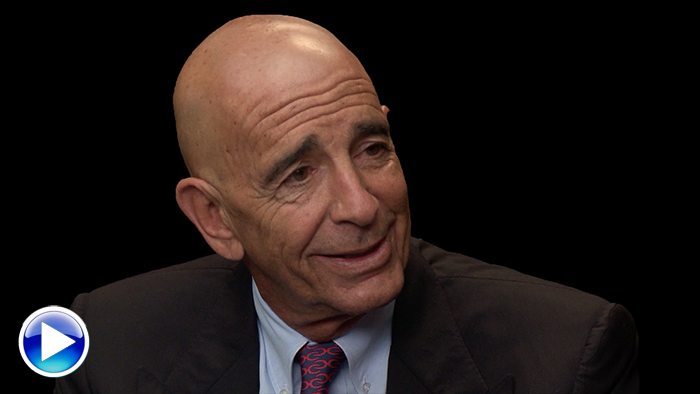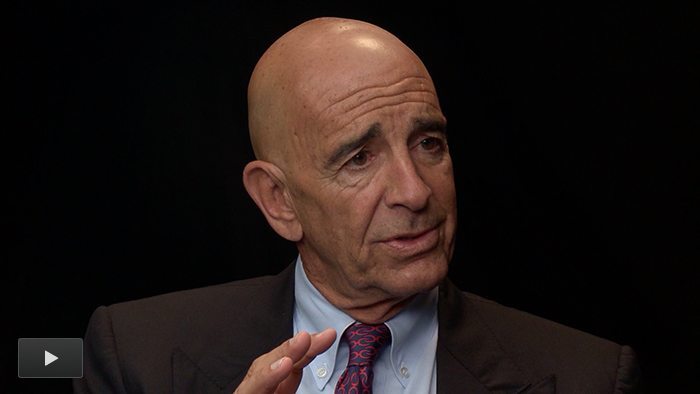Barrack: Europe Just Like U.S. in 2008
Europe’s real estate market is the equivalent of the U.S. in 2008, according to Tom Barrack, CEO of Colony Capital. But unlike the U.S., it’s much more difficult to mine opportunities.
Transcript Download Transcript
Europe Akin to US in 2008
With Tom Barrack of Colony Capital
Zoe Hughes, Privcap:
I’m joined here by Tom Barrack, founder, chairman and CEO of Colony Capital. Thank you very much for joining us.
Tom Barrack, Colony Capital:
It’s a pleasure.
Hughes: Colony has been, very much, a truly global investor, particularly for real estate since day one. As you take a look outside of the US and you look at the investment landscape particular to Europe, what are you seeing in Europe? This has been billed as a distress play of a generation and yet it just doesn’t seem to be coming to fruition. There’s a lot of frustration on the sidelines.
Barrack: As Americans and as institutions in America, you first have to start with understanding the cultural difference. There is no Europe, right? There’s a European community but France views itself very different from Italy, Italy views itself very different from Spain, Spain et cetera, et cetera. Within each of those categories, you don’t have a united banking system, you don’t have a united legal system, you don’t have a united bankruptcy system and you don’t have a united view of politics amongst them. Most of those countries, broadly speaking, in Europe have a socialistic undertone.
Thinking that as an institution or as a lender, taking advantage of distress in Europe economically is short sighted because it’s not in their culture, it’s not in the European culture to hammer their own borrowers. As a matter of fact, a European bank really looks and says, “I have three major constituencies to worry about and the last one, the fourth one, is the shareholder.”
Hughes: Is there any opportunity in Europe then?
Barrack: Yes, but it’s working with the borrower, it’s not working with the bank. The bank is number one. The regulatory quagmire is deep, so there’s Basil III, there are broad themes, there’s no united banking regulatory system, so there’s no pressure for them to mark to market. You don’t see any divestitures. The reason there’s no pressure for them to mark to market is that there’s no resolution strategy. If you were going to foreclose on a building in France, it would take you nine years of legal processes and redemptions before you could ever effectively resolve that. In Italy, over a decade, it’s almost impossible.
Hughes: How does the US investment manager, and particularly, the investors outside of Europe looking into Europe, how do they begin to even play?
Barrack: If you look at what’s happening, there are a couple of things that are going on. Ireland, NAMA is a look-alike of the RTC. Bill McMorrow and Kennedy Wilson have done the great job of taking a big position in Ireland but Ireland has five million people. With the UK, we lure ourselves into thinking we speak the same language and we have the same legal system. We don’t actually, but it functions the same.
Everywhere else, it’s really participating on the borrower recap side. What’s happening is it’s de-levering, for sure. There’s no financing in the marketplace going forward but everybody’s extending and amending, more or less like we did here. The answer is, they do have to recapitalize, they do have to restructure, and they do have to de-lever but the entry level is with the borrower, not with the bank.
We had started early in corporate acquisitions in Europe. Most of what we’ve done has all been corporate acquisition. Carrefour, Accor, Boot, Buffalo Grill, Lucia, Cos Esmeralda, Perry St. Germaine, all of the things that we’ve done, Fairmont Raffles, have been corporate entities. With those corporate entities in the restructuring, there is corporate debt that is trading hands. Of course, the insurance companies and pension funds across Europe have been eighty percent only rated debt, corporate debt, that’s what they’ve invested in.
The debt markets move easier in a recapitalization structure when it’s in-sync with the borrower. I think that’s going to be the first entry, is through the borrowers. Real estate is owned in very strong hands in all these places, so the good real estate isn’t distressed. If you go to France, Italy, even Spain, which is probably the worst of all of those and has the worst social pressures, the access of what American investors are thinking of quick turns and resolutions at 25 or 30 percent internal rates of return is not going to happen that way. There are no auctions, and the banks aren’t selling. The banks are very smart and the last thing they want to do is sell to some Yankee, by the way. The restructuring comes in through the borrower who now has a new source of capital. We call it “last money, first money out.” We’re huge in the preferred equity business. We’re huge in the mezzanine business.
Hughes: What scale of opportunity are you potentially hopeful of in Europe, particularly in terms of gap financing?
Barrack: We’re in the process. We’re at the beginning of raising a new fund, which will be a billion Euro fund. We think we’ll deploy that in small and mid-cap companies within eighteen months. The opportunity is immense. Hollande and everybody in France … and I’m a Francophile, I love France. It’s one of the richest, most incredible countries in the world and also one of the most complex. Everybody within France today looks and says, “It’s over.” Hollande is going to socialize everything into tiny little dust particles and there’s going to be nothing left.
Cycling ahead of all of you a couple of decades, I remember the same rhetoric in 1982 with Mitterrand. It was exactly the same dialogue. What happened is, after two years, Mitterrand realized that those policies and practices weren’t going to work and it turned around the next four years bigger and better than anybody had imagined.
I think you’re going to see the same thing.
I think Europe truly is at the bottom. The central banks have proved that nothing is going to crash … you’re not going to have an uncontrolled crash. What you’re going to have is growth at the bottom of the cycle. Growth at the bottom of the cycle, in my parlance, is the time to buy, right? If you wanted to buy a condominium, is now the best time to buy a condominium in New York when they’re selling at $10,000.00 a square foot? Probably not. The best time to buy was four years ago or maybe three years from now. I think that’s the moment. In Europe today, it’s 2008 with a much more difficult map on how you mine those opportunities.


